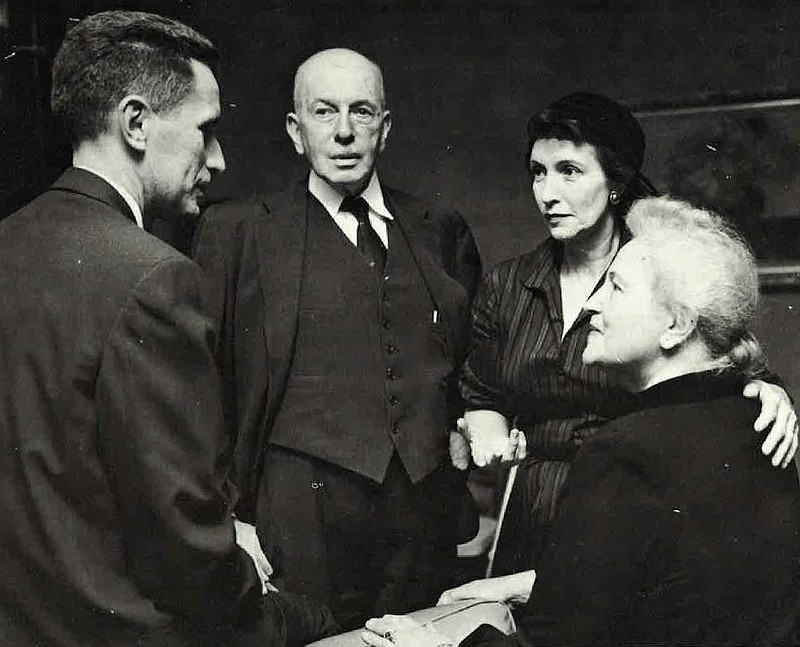The Chatttanooga Times reported on Oct. 20, 1943, that 1,400 music lovers gathered at Central High School to hear the Chattanooga Opera Association's presentation of "Carmen." Hard work by Dr. Werner Wolff, the former conductor of the Hamburg Opera, and his wife, Emmy Land Wolff, a leading soprano from Hamburg, brought opera to a reality.
Werner Wolff was born in 1888, the son of a famous concert manager, Herman Wolff, who was one of the foremost names in music in Europe and founder of the Berlin Philharmonic Orchestra. In his parents' home, young Werner met many of the great musicians of the time: Brahms, Saint-Saens, Bruckner, Rubinstein and Tchaikovsky. After a brief detour with a law degree, Werner became an acclaimed European conductor, serving as the director of the Hamburg Opera for 17 years.
Emmy Land Wolff got her musical start in Vienna, Austria, and was soon called to be a dramatic soprano in the State Opera House in Hamburg. She subsequently performed in numerous concerts and grand operas throughout Europe.
During the 1930s, the Wolffs saw that they could not conform to the Nazi idea of music reflecting only "the inborn German philosophy." With their daughter, $60 and assistance from fellow musicians, they left Hamburg in 1938 to come to the United States. Arriving in New York, they were advised by friend and fellow ex-pat Walter Damrosch to leave New York for a part of the country not so crowded with European musicians escaping the Nazis. The Wolffs found their way to Tennessee Wesleyan College at Athens. Wolff remarked: "We were given a gracious and friendly welcome by most of the people of Athens, although a few looked upon us as German spies. But the world was at the threshold of war, and we understood. I read the works of Mark Twain as a boy, and I think I understand American psychology."
News of such prominent musicians relocating to Tennessee began to filter to the larger community of Chattanooga. In 1942, the Wolffs came to Cadek Conservatory. Their willingness to devote their talent and experience to amateur opera productions, sometimes with just a few singers and a piano, made Chattanooga unique among cities of comparable size.
The first opera under the Wolffs' leadership was "Il Trovatore," performed on a tiny stage at the University of Chattanooga, with stage direction by Dorothy Hackett Ward. Local singers Milton Allen, who later served as music supervisor for Hamilton County Schools for many years, James Sasse and Carol Jones appeared in the first production. Jay Craven, clarinetist, remembers being instructed by Dr. Wolff, "Don't play notes, play music."
Tom Wolfe, a long-time opera supporter, pointed out that Dr. Wolff was particularly adept at identifying promising young singers. One was a young Beverly Sills, who came to town in 1955 to sing Dona Elvira in Mozart's "Don Giovanni." On her 1980s farewell tour, she sang at the Tivoli and expressed her thanks to Chattanooga for helping to launch her brilliant career.
Madame Wolff died in 1955 and was buried in Forest Hills Cemetery. Wolff continued conducting until 1959. After 17 seasons, his parting wish was, "May opera survive and thrive." The Times commented that opera had grown from mere piano accompaniment to full stage presentation, symphony orchestra and guest stars from the Metropolitan and New York City opera companies during his time.
Once retired, Wolff returned to Europe and died in Switzerland in 1961. A Times editorial commented: "He left an area enriched as a result of his directorship for many years of the Chattanooga Opera, to which he and his late wife brought their long experience, acquaintanceship for decades with internationally famed artists, and their own keen and infectious sensitivity and talent. Wolff will be buried far from his beloved Emmy Land Wolff. But the very distance separating them will serve to emphasize the limitless breadth, significance and satisfaction of the art they so nobly served."
In 1985, the Chattanooga Opera Association merged with the Chattanooga Symphony to create the nation's first joint symphony and opera company. Recent productions have included "Amahl and the Night Visitors," "The Pirates of Penzance" and concerts of opera arias and choruses. Next season, the CSO will present "The Tabasco Opera," written in 1894. It toured the country at the time, including a stop in Chattanooga, and its revival should be an interesting nod to our history.
Frank "Mickey" Robbins is an investment adviser at Patten and Patten. For more, visit Chattahistoricalassoc.org or call Lavonne Jolley 423-886-2090.
